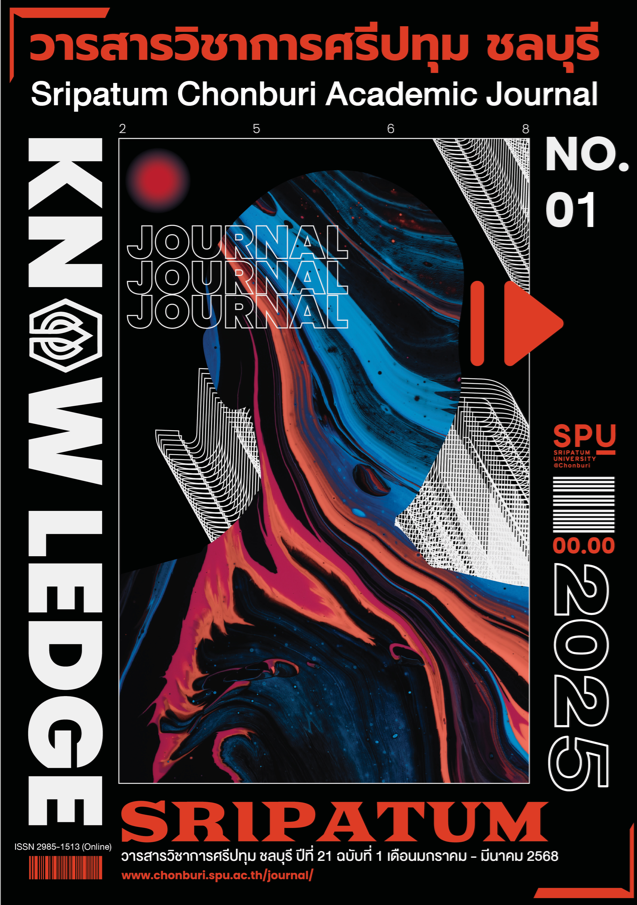LEGAL PROBLEMS AND OSTACLES CONCERNING TO FINE PENALTY OF UNDER THE LAND EXCAVATION AND FILL ACT B.E.2543 (2000)
Keywords:
Penalty, Comparison and Fine Imposition, Excavation and Land fillingAbstract
This thesis seeks to analyze the process of determining penalties under the Excavation and Land Filling Act, B.E.2543 (2000), specifically focusing on the comparison and imposition of fines by local officials. The study addresses the absence of a clearly defined basis for offenses when an individual fails to comply with ministerial regulations prohibiting excavation or landfilling under Section 6(1) of the Act. Furthermore, it examines the imposition of penalties for failure to report to local authorities when valuable antiquities, art objects, fossils, or minerals of economic or geological significance are discovered during excavation. The research methodology involves document analysis, including legal texts, articles, research studies, and comparative analysis with international, foreign, and Thai legal principles. The research aims to propose reforms to address the existing legal gaps and enhance fairness in enforcement.
The research reveals that under the current Excavation and Land Filling Act, B.E.2543 (2000), the authority to impose fines is vested in local officers, which grants significant discretionary power to individual officers. This practice increases the risk of corruption and may lead to unjust outcomes for offenders. This approach contrasts with other legal frameworks, where committees, rather than individuals, are responsible for the comparison and imposition of fines, thereby mitigating the risk of illicit benefit.
Moreover, the failure to establish a clear basis for offenses relating to non-compliance with ministerial regulations on prohibited excavation areas constitutes a significant legal gap. As a result, offenders may evade punishment in instances where ministerial regulations have been issued for specific areas, including partial land excavation prohibitions. Additionally, the current law allows fines to be imposed by local officers in cases where an individual fails to report the discovery of antiquities, art objects, fossils, or minerals during excavation. This provision may undermine the deterrent effect of the law, as offenders may be less inclined to report such discoveries, given the leniency of the penalty.
The researcher recommends amending the Excavation and Land Filling Act, B.E.2543 (2000) to replace the current system of allowing individual officers to compare and impose fines with a committee-based approach. This would reduce the risk of corruption and ensure greater fairness in enforcement. Additionally, the law should be revised to explicitly define offenses related to non-compliance with ministerial regulations and local provisions concerning prohibited excavation and landfilling areas.
Furthermore, it is proposed that the penalty for failing to report the discovery of valuable antiquities, art objects, fossils, or minerals should be made more stringent, removing the option for the offense to be resolved through comparison and fine payment. Such changes would close existing legal loopholes and strengthen the effectiveness of the Act in achieving its objectives.
References
กรมโยธาธิการและผังเมือง. (ม.ป.ป.). โครงการศึกษา วิเคราะห์และการแปลกฎหมายว่าด้วยการขุดดินและถมดินการศึกษา วิเคราะห์โดยละเอียด กฎหมายว่าด้วยการขุดดินและถมดินของประเทศไทย ประเทศสหรัฐอเมริกา ประเทศญี่ปุ่น ประเทศสหราชอาณาจักรและประเทศสหพันธรัฐมาเลเซีย. กรุงเทพฯ: กรมโยธาธิการและผังเมือง.
บัณฑิต ถึงลาภ. (2558). ปัญหาข้อกฎหมายเกี่ยวกับโบราณสถานตามพระราชบัญญัติโบราณสถาน โบราณวัตถุ ศิลปวัตถุ และพิพิธภัณฑสถานแห่งชาติ พ.ศ.2504. กรุงเทพฯ: สถาบันพัฒนาข้าราชการฝ่ายตุลาการศาลยุติธรรม สำนักงานศาลยุติธรรม.
พระราชบัญญัติการขุดดินและถมดิน พ.ศ.2543. (2543). ราชกิจจานุเบกษา. เล่ม 117 (ตอนที่ 16 ก), หน้า 1.
พระราชบัญญัติควบคุมอาคาร พ.ศ.2522. (2522). ราชกิจจานุเบกษา. เล่ม 96 (ตอนที่ 80), หน้า 1.
พระราชบัญญัติโบราณสถาน โบราณวัตถุ ศิลปวัตถุและพิพิธภัณฑสถานแห่งชาติ พ.ศ.2504. (2504). ราชกิจจานุเบกษา. เล่ม 109 (ตอนที่ 38), หน้า 12.
พระราชบัญญัติแร่ พ.ศ.2560. (2560). ราชกิจจานุเบกษา. เล่ม 134 (ตอนที่ 26 ก), หน้า 1.
พระราชบัญญัติโรงงาน พ.ศ.2535. (2535). ราชกิจจานุเบกษา. เล่ม 109 (ตอนที่ 44), หน้า 62.
พระราชบัญญัติส่งเสริมและรักษาคุณภาพสิ่งแวดล้อมแห่งชาติ พ.ศ.2535. (2535). ราชกิจจานุเบกษา. เล่ม 109 (ตอนที่ 37 ก), หน้า 1/4.
พรสันต์ เลี้ยงบุญเลิศชัย. (2552). รัฐธรรมนูญแห่งสหรัฐอเมริกา คำอธิบายเรียงมาตราพร้อมคำพิพากษา. กรุงเทพฯ: วิญญูชน.
พลัฐวัษ วงษ์พิริยชัย. (2557). คำอธิบายที่มาและวัตถุประสงค์รายมาตราพระราชบัญญัติการขุดดินและถมดิน พ.ศ. 2543 (พิมพ์ครั้งที่ 2). กรุงเทพฯ: สำนักงานคณะกรรมการกฤษฎีกา.
สิทธิกานต์ ธีระวัฒนชัย. (ม.ป.ป.). การขุดดินและถมดินของตามกฎหมายสหพันธรัฐมาเลเซีย (ออนไลน์). เข้าถึงได้จาก: https://lawforasean.krisdika.go.th/File/filesA2.pdf [2567, 2 สิงหาคม].
Mineral Development Act 1994. (1994). Mineral Development Act 1994 (Act 525)) of Malaysia (Online). Available: https://www.fao.org/faolex/results/details/en/c/LEX-FAOC037927 [2024, August 2].
Street, Drainage and Building Act, 1974. (1974). Street, Drainage and Building Act, 1974 (Act 133) of Malaysia (Online). Available: https://www.hba.org.my/laws/street/part1.htm [2024, August 2].
Town and Country Planning Act 1976. (1976). Town and Country Planning Act 1976 (Act 172)) of Malaysia (Online). Available: https://www.fao.org/faolex/results/details/en/c/LEX-FAOC130374/ [2024, August 2].
Downloads
Published
Issue
Section
License
Copyright (c) 2024 Sripatum University Chonburi Campus

This work is licensed under a Creative Commons Attribution-NonCommercial-NoDerivatives 4.0 International License.
บทความทุกบทความเป็นลิขสิทธิ์ของวารสารวิชาการศรีปทุม ชลบุรี



